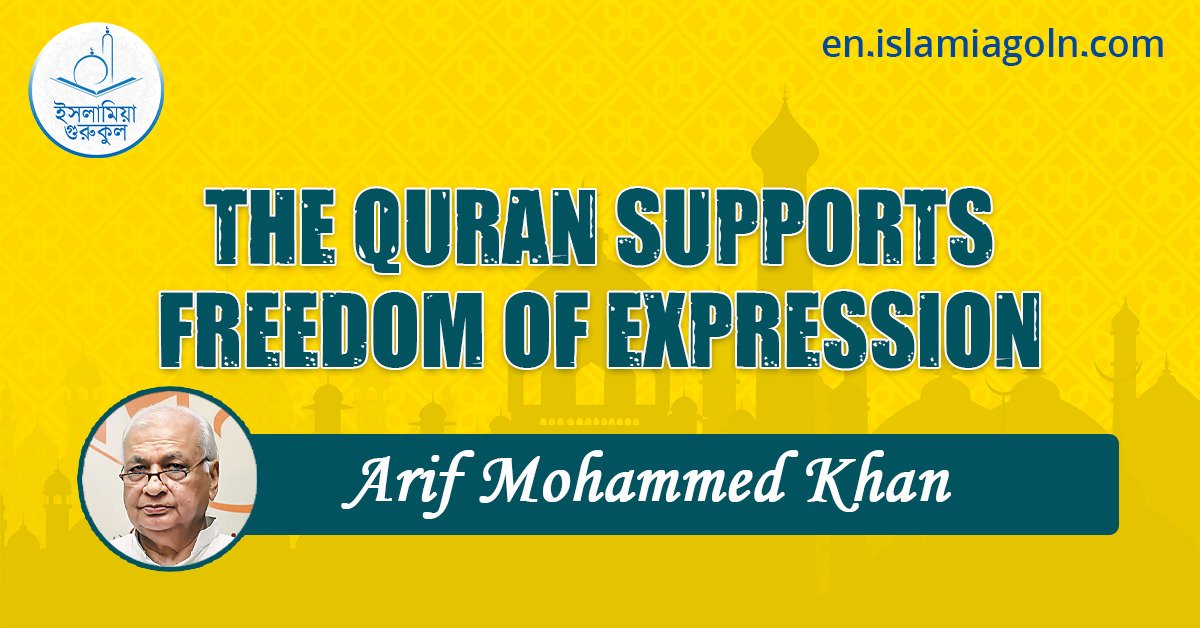Today’s Topic of Discussion: THE QURAN SUPPORTS FREEDOM OF EXPRESSION

THE QURAN SUPPORTS FREEDOM OF EXPRESSION
Is freedom of expression incompatible with Islam and its teachings! I Such a charge is often made on the basis of the absence of democracy and civil liberties in most Muslim countries. The validity or otherwise of the criticism can be established in the light of the provisions of the Quran and authentic Hadith, because Muslims themselves consider the rule of the first four successors of the Prophet, which lasted about 30 years, as righteous, and hold most of the later rulers as deviants.
In the Quranic perspective, all freedoms flow from the concepts of inherent ‘dignity’ of mankind: ‘We have honoured the children of Adam’ (17 70) and ‘equality’ based on their common origin: ‘O mankind! We created you from a single (pair) of a male and a female and made you into nations and tribes that you may know each other’ (49.13). The Quran repeatedly highlights these two principles in a number of verses spread all over the book.
The oft-quoted Quranic verse ‘there is no compulsion in religion (deen)’ (2.256) is a logical corollary of the principle of dignity and equality of all members of the human family. It must be borne in mind that the Arabic term ‘deen’ has wider connotations than the English term religion.

It includes faith, belief, judgement, conscience and way of life. So when compulsion is ruled out, it means not only the undiluted freedom of religion but also includes the freedom of conscience and expression and the freedom to pursue a way of life suited to one’s genius.
Freedom of expression, like other basic human rights, is ordinarily denied by the regimes designed to protect the rulers instead of the ruled. The lack of accountability and checks leads to dictatorship and tyranny. The Quran takes an extremely grim view of such dispensations and says that ‘Kings when they enter a country despoil it and make the noblest of its people its meanest thus do they behave’ (27.34)
The Quran further says that unchecked power often leads to oppression and persecution and holds that one of the divine methods to prevent such oppression is a change of regimes: ‘For had it not been that God checks one set of people by means of another. monasteries, churches, synagogues and mosques, wherein the name of God is mentioned much would surely have been pulled down’ (22.40)
It is in line with the Quranic teachings that the Holy Prophet declared that the ‘best form of jihad is to utter a word of truth to a tyrannical ruler’ (Ibn Maja: 4011). In another tradition reported by Imam Hanbal, the failure to give expression to one’s views has been equated with humiliating oneself. It is stated that ‘When one ought to speak and does not speak, will be asked on the day of judgement, what stopped him from speaking? The person will reply ‘fear of people’ Then he will be told that it was more fitting to fear God.

Muslim has reported another tradition that says, ‘If any of you sees some evil, he should set it right with his hand, if he is unable to do so, then with his speech and if not able to do so then let him denounce it in his heart.
These teachings promoted such a sense of freedom that when the second Caliph ruled against heavy amounts of dower (mahr), Fatima bint Qays, an old lady, protested fearlessly on the basis of a Quranic verse, and her objections were upheld. However, 30 years later the republic yielded to monarchy and force and compulsion became the rule, a legacy that continues till day. And certainly, autocracy and freedom of expression are ill at ease.

1 thought on “THE QURAN SUPPORTS FREEDOM OF EXPRESSION”